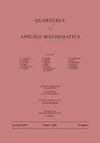离散时间和连续时间网络的矩阵尺度弹性一致性
IF 0.9
4区 数学
Q3 MATHEMATICS, APPLIED
引用次数: 0
摘要
本文研究了计算机科学和分布式控制中多智能体网络上矩阵尺度的弹性一致性问题。与现有的共识问题研究不同,在共识问题中,主体的状态收敛到一个共同的值或达到一些规定的比例,我们采取了一种更通用的矩阵缩放方法来适应多维状态的相互依赖性。我们开发了一个统一的分析框架来处理离散时间和连续时间动态代理的矩阵尺度弹性一致性,其中底层通信网络被建模为一般的有向时间相关随机图。我们提出了新的分布式协议,以保证在拜占庭代理存在的情况下,网络中协作代理的矩阵级共识,拜占庭代理对系统有充分的了解,并对集体共识目标构成严重的安全威胁。合作代理具有多输入多输出的特点,拜占庭代理的数量和身份对合作代理来说是不可用的。我们的数学方法利用了矩阵分析、控制论、图论和鞅收敛。通过算例验证了理论结果的有效性。本文章由计算机程序翻译,如有差异,请以英文原文为准。
Matrix-scaled resilient consensus of discrete-time and continuous-time networks
This paper studies the matrix-scaled resilient consensus problems over multi-agent networks as occurring in computer science and distributed control. Unlike existing works on consensus problems, where the states of agents converge to a common value or reach some prescribed proportions, we take a more general matrix-scaled approach to accommodate the interdependence of multi-dimensional states. We develop a unified analytical framework to deal with matrix-scaled resilient consensus of discrete-time and continuous-time dynamical agents, where the underlying communication network is modeled as a generic directed time-dependent random graph. We propose new distributed protocols to guarantee the matrix-scaled consensus of cooperative agents in the network in the presence of Byzantine agents, who have full knowledge of the system and pose a severe security threat to the collective consensus objective. The cooperative agents feature multiple input and multiple output, and the number and identities of Byzantine agents are not available to the cooperative ones. Our mathematical approach capitalizes on matrix analysis, control theory, graph theory, and martingale convergence. Some numerical examples are presented to demonstrate the effectiveness of our theoretical results.
求助全文
通过发布文献求助,成功后即可免费获取论文全文。
去求助
来源期刊

Quarterly of Applied Mathematics
数学-应用数学
CiteScore
1.90
自引率
12.50%
发文量
31
审稿时长
>12 weeks
期刊介绍:
The Quarterly of Applied Mathematics contains original papers in applied mathematics which have a close connection with applications. An author index appears in the last issue of each volume.
This journal, published quarterly by Brown University with articles electronically published individually before appearing in an issue, is distributed by the American Mathematical Society (AMS). In order to take advantage of some features offered for this journal, users will occasionally be linked to pages on the AMS website.
 求助内容:
求助内容: 应助结果提醒方式:
应助结果提醒方式:


